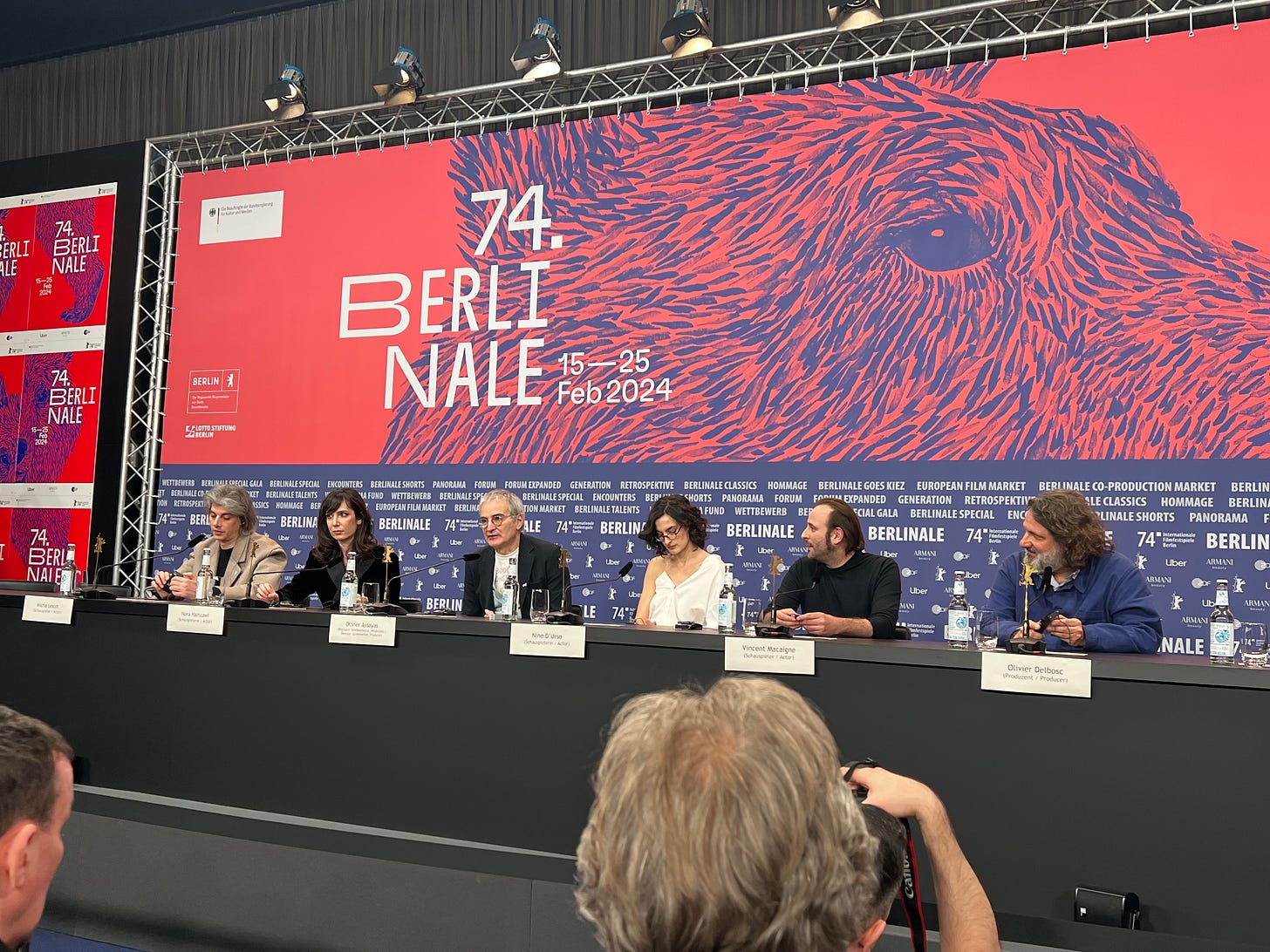'Hors du temps' Review (Berlinale)
Assayas spins a cinematic gem that feels intricately designed to speak directly to me once again.
The cast and crew of Olivier Assayas’s new film delivered one of the most interesting artistic/intellectual press conferences of Berlinale, which much of this review incorporates. As with many Assayas film, he focuses on the more cinematically-banal aspects of life, like talking about mid-century writers or stories about grandparents meeting a Renoir, but makes it a uniquely personal and engrossing experience for the viewer, with many aspects to pick apart on various historical, social, cultural, and artistic levels. Therefore, I will temporarily step away from the several Berlinale political pieces to focus on Hors du temps. Enjoy.
Although Hors du temps (“Suspended Time”) takes place during the beginning of the Covid pandemic (remember April ‘20 when leaving groceries outside for two hours and scrubbing them down with soap/disinfectant would destroy the virus?), it isn’t about Covid or the lockdown, according to director/screenwriter Olivier Assayas—Ceci n'est pas une pipe. That global nuisance was only the framing device to confine four people in one space, albeit one that was inherited by two brothers in the lush French countryside. And while mourning is the main link between it’s title (literally “out of time” and “limitless” in English) and setting, it plays out as an Assayasian comedy where sibling bickering and artistic arguments create all the tension.
Like in Irma Vep (the HBO mini-series), Assayas created a somewhat autobiographical story with Vincent Macaigne as his stand-in, called Paul. They both went back to their childhood home when the lockdown began, stayed with their radio-DJ brother Etienne (Micha Lescot), and confronted the limitations of confinement mixed with the bittersweet confrontations with their childhood past. In the film, Paul’s girlfriend (Nine d'Urso) has been living with him for over a year while Etienne’s girlfriend (Nora Hamzawi) moved in to avoid the density of Paris. They get on, mostly in peace, until tiny moments of annoyance (Paul is neurotically sensitive to Covid contamination) rupture the thin surface of adulthood the two brothers constructed since leaving home. Assayas wrote the screenplay three years ago very self-consciously as an auto-biography because he wanted to physically write down and fully express the emotions he felt during that time with his brother. He held onto the script and waited for what he thought would be an epidemic of pandemic films released soon after, shot Irma Vep instead, and then decided to make this near-era period-piece.
The conceit of the film is highly existential, referential, generational, and fanciful: what happens when two people who grew up in a world that doesn’t exist now? After all, as Hamzawi said, when the brothers last lived there, WiFi didn’t exist, which is how the two pairs conduct their daily business, zoom sessions, therapy sessions, radio DJing, grocery ordering, and amazon shopping. It’s therefore a story of adapting to generations; in the introduction Assayas provides a voice-over on how the property fell into their family’s hands accompanied by images of nature, which turns out to be the missing element in the bustle of everyday living. The pandemic had people literally return to nature, as had the many late nineteenth- and early twentieth-century French artists referenced throughout. The film’s cinematography favors nature and stacks of book over the characters; in nearly every shot trees, bushes, grass, dishes, and furniture surround the actors, who never get their action shot, heroic closeups, or sweeping long-takes.
Macaigne stressed that the generational aspect, which is universal and unconfined to just individuals during lockdown, is crucial to understanding the film. As Paul and Etienne received the property from their family, so to will their kids from them. The memories made during this moment are merely photographs, pieces of memorabilia that are highly personal to one gen but not the next. Like books and art, these snapshots in time must be rediscovered and imprinted with new meaning. As Macaigne further pointed out, this is the universal dreams of cinema itself. Although much of the film is autobiographical and scripted, it’s nonetheless a living organism (Assayas’s words) that evolves through the actors’ own inventive transformations. Something else entirely comes into being, akin to how these artistic artifacts become something new based on the individual. Therefore, Assayas showed things exactly how he experienced them, which is how broader truths via individual stories can be discerned to a collective audience.
Many of us (not me) who went back home during the pandemic were faced with the uncomfortable reality of confronting their past. A certain regression takes places that is a kind of arrested development sequel. Paul and Etienne didn’t mature and move away until Etienne got married. But even after their parents’ deaths, the two butt heads like teen-agers trying to claim as much freedom as their would parents allow. This tension is resolved in the end, which I won’t spoil.
So far this film is at the top of my Berlinale rankings, unlike probably every other critic, but we’re only on day four or so. I will be coming back with more reviews, more stories and experiences, then will finish off next weekish with a wrap-up post about the Berlinale experience overall.
Thank you once again for checking out my Substack. Hit the like button and use the share button to share this across social media. And don’t forget to subscribe if you haven’t already done so to read more on the Berlinale.






